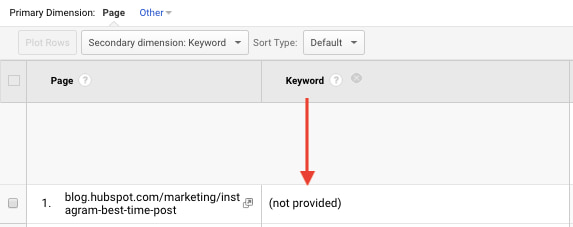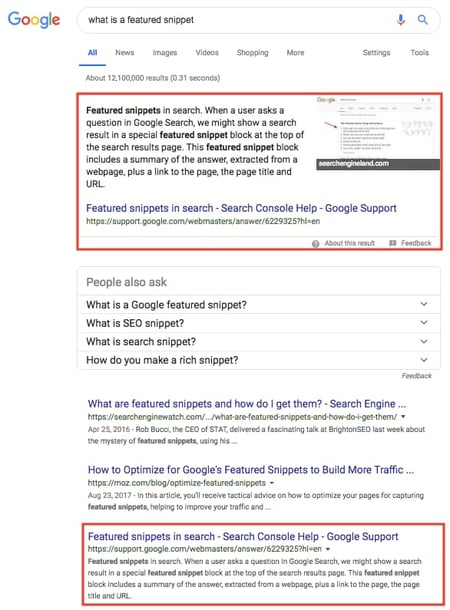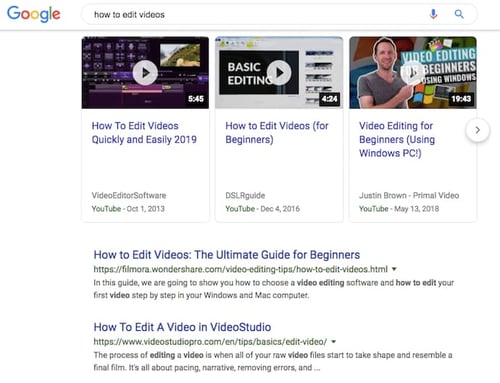9 Hashtag Marketing Tactics That Actually Work
With social network updates happening faster than you blink, using hashtags to raise brand awareness is not as easy as adding # to your target keywords. Brands must not only…
With social network updates happening faster than you blink, using hashtags to raise brand awareness is not as easy as adding # to your target keywords. Brands must not only…
[bctt tweet="Influencer marketing is not just about big celebrity names #influencermarketing " username="lenakhalid"] has become one of, if not the most powerful, tool in a marketing team's toolbox today. With…
We are a society tearing through the digital landscape, and there’s no hint of us slowing down anytime soon. New stars are born every day in the digital world. Some…
Have you ruined your marketing budget by spending thousands of dollars on weak advertising methods that provide little or no return? It’s time to replace those methods with something more…
Act Now And Get Instant Access To This Ultimate Collection Of Local Marketing Training Videos... - Drastically increase your learning curve! - Watch us live, No imagining! - Professional US…
Would you like to skyrocket the productivity of ANY Offline Business by applying the Hottest Local Marketing Techniques on the web in just a few hours from now, guaranteed? Read…
For a long time, keyword rankings were a staple part of any SEO campaign. In a lot of cases they were a primary metric used to judge performance.
Today, your Google keyword ranking is just one of several reasons your traffic can increase or decrease.
Google keyword ranking indicates where on Google's search engine results pages (SERPs) an individual webpage is positioned when a user enters a keyword. Typically, 10 results comprise a SERP, and the higher your position on that SERP, the more organic traffic your webpage will get. Lately, however, there are other SEO variables marketers need to pay attention to.
Just six or seven years ago, we had so much more information on the keywords users were searching to reach our web content. All of this information was available transparently within Google Analytics, and you could get relatively accurate search volume estimates from within Google's Keyword Tool.
>" src="https://no-cache.hubspot.com/cta/default/53/bd685600-02f9-40f3-a4e7-18488a8d79ba.png">
The first major update that changed this was Google's move to encrypted search and the dreaded appearance of "not provided" within Google Analytics. This means you can no longer find out which keywords are bringing in the organic traffic your website is receiving. The "not provided" tag looks a little something like this:

This created a ripple effect across many SEO software providers that made a lot of their tools less effective -- or at least tougher -- to measure the impact coming from organic search on a granular level.
Google's next major change -- a more recent one -- was its decision to move search volume estimate within their Keyword Planner tool to show estimates in broad ranges. Instead of learning that a keyword was being searched for 1,400 times each month, we're told that it's searched between 1k-10k times per month. This isn't overly helpful when developing your content strategy.
These changes have forced marketers to adapt their search strategy to focus less on individual keywords and shift to a topic-centric content strategy, especially for content sitting at the top of their marketing funnel.
One of the major criticisms of keyword ranking data is the fact that it is largely inaccurate. Many industry leaders and even software providers of rank tracking data have admitted that this is the case.
The reasons behind this can be broken down into three broad buckets:
Around the time of the launch of Google+, the SEO industry was talking a lot about personalization within search. Even after the death of Google+, personalization has remained a big consideration.
Bonus points if you remember Authorship snippets (circa 2012).
Ultimately, Google will deliver results that are personalized to a user based on their search history. This means that if I were to search for a query like "electric cars" and I'd previously been browsing the Tesla website, it's a possibility that Google would tailor the rankings of the search results to show Tesla near the top.
This wouldn't be the case for someone that hasn't previously visited Tesla's website, which makes it very tough to determine which website actually ranks #1 (because it can be different from one person to the next).
Whilst personalization plays a part in the ambiguity of keyword rankings, it's nothing compared to the role of implicit query factors like device and location.
One of Google major advancements in search over the past five years has been its ability to take into account aspects of a search query that aren't explicitly stated. To make sense of what I've just said, let's take a query like, "Boston restaurants".
Go back to 2010 and a search for "Boston restaurants" would yield a list of relatively generic websites that either talk about Boston restaurants or maybe are a restaurant.
Fast-forward to 2018 and a simple search for "Boston restaurants" will arm Google with a whole lot more information than before. They're able to see which device you've searched from, where you're located whilst you're searching, even if you're currently on the move.
Let's say that you searched on an iPhone and you're walking around in the center of Boston at 11:30 am. Here's what this query would actually look like to Google:
"Which restaurants are currently open for lunch within walking distance of my current location in the center of Boston, MA?"
They've gathered all of this information without the individual even having to type it. As a result, they're able to completely tailor the search results to this individual searchers' current situation.
So … to answer the question of who ranks #1 for "Boston restaurants" becomes an even more challenging task.
Strong keyword rankings don't always equate to high volumes of organic traffic, let alone improvements in revenue. As I mentioned at the beginning, we've lost a lot of visibility on search volume metrics, which makes it very difficult to accurately estimate the amount of traffic you can gain from an individual keyword. Factor in the changing appearance of the search engine results page (e.g. the widespread increase in featured snippets) and it becomes an even more daunting task.
If keyword rankings are your North Star, you may be traveling in the completely wrong direction.
Here are three search features that can interfere with your keyword rankings while presenting you with opportunities to capture traffic from Google in new ways:
Featured snippets are the enhanced search results that appear at the very top of Google SERPs. They're a form of "rich snippet," a grouping of structured data that Google has collected from a webpage. And due to their size, they can take an extraordinary amount of traffic away from the the results beneath them.

What makes featured snippet results so important? Publishers can earn them regardless of their Google rank. That's right, it is entirely possible for a site below position #1 on the SERP to win this top-dwelling space, making Google rank noticeably less important for topics that are vulnerable to them. Check it out below -- as you can see, the featured snippet is pulling in a result that technically ranks in position 3, allowing it to steal organic traffic from the results in positions 1 and 2.
Video is playing an increasing part in content marketing strategies, and not for superficial reasons. Videos published to any platform, not just YouTube, are now ending up on SERPs where Google has determined the intent behind a search query is best served in this medium.

These video results might take away traffic from publishers, but they also allow you to "rank" for keywords you might not have written content to target.
Image packs are large groupings of images that Google pulls into its SERPs from the Images tab in a Google search. As you can see below, they can be so large that they take up all the space "above the fold" of a SERP. This makes results ranking in position 1 for a particular keyword hard-pressed to capture organic traffic from that keyword unless they've published images dedicated to (and optimized for) this keyword.

When all you're obsessing over is where each page is tracking against a ranking goal, you'll likely be misses a ton of other value that your content is bringing in. For example, what if you've built out some content with the primary goal of driving backlinks or social traffic, but it isn't necessarily designed to rank for much itself (e.g. a research report)? Using keyword rankings as a determining factor of success could evaluate content in a completely inaccurate way.
To combat a lot of the issues I raised above, we shifted the way that we measured content at HubSpot. For the past couple of years we've taken a step back from analyzing the performance of content on a page-by-page level and looked at the performance of content at the topic cluster level.
Organic search traffic and conversions are our primary search goals, so when we group our content into clusters to try and gain visibility for any searches related to a given topic, we look at the collective performance of these groups of webpages vs just the performance of individual pages.
This model of analysis helps us account for the varying goals of each individual piece of content. Also, running this analysis at scale tells us which topics tend to drive more traffic growth compared to others, and which topics tend to convert traffic at a higher rate.
This information tends to provide much clearer insights for the team as to what they should focus on next without obsessing over individual keyword rankings.
Despite everything I've said above, I'm not actually saying that keyword rankings are dead (I can already see the tweets ready to be fired at me!). Keyword data can be useful for digging into any SEO problems that happen to your site, and also to look into the intent behind certain types of searches.
That said, the new version of Google Search Console that has just recently been rolled out should give you pretty much everything you need here.
More than anything, as a marketer you need to be aware that the data that you're looking at related to keywords is not 100% accurate. As a result, this should never be your primary performance metric.
Opinions expressed by Entrepreneur contributors are their own. While it can be hard to imagine when your business just started out, you will face some challenges as it grows. You'll…
Every day, artificial intelligence or "ai" gets smarter and easier to work with. And it’s no longer just for the large businesses and corporations. AI is accessible to small businesses…
Best-in-class marketers are 56% more likely to use data and analytics platforms. Why? Because the best marketers know that data, when used well, is the best way to get results…
This site is protected by wp-copyrightpro.com